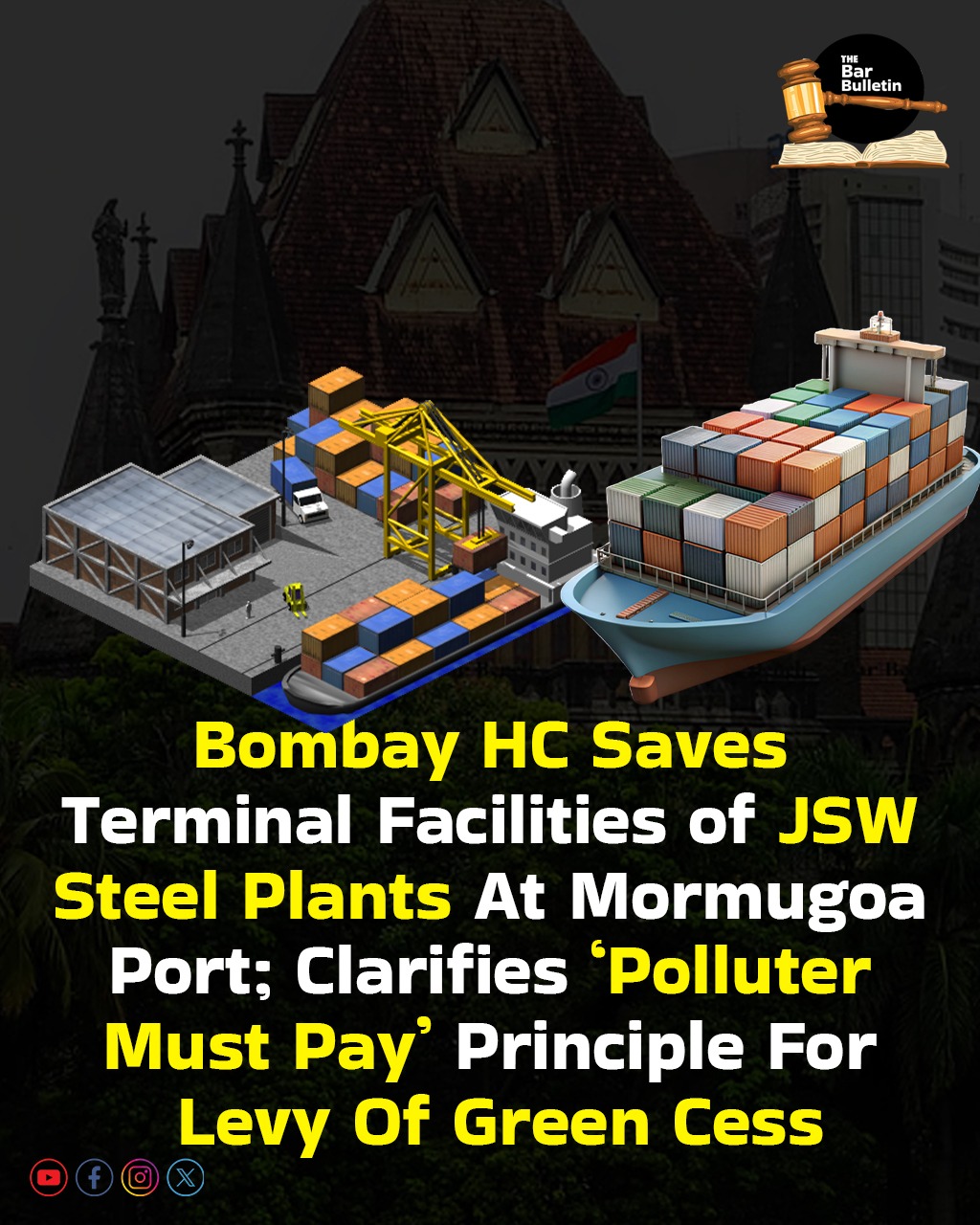The Bombay High Court (Goa Bench) clarified that since the petitioners (a mechanized terminal facility established primarily to handle the logistic needs of the JSW Steel plant) only operate the berth and do not bring the product or cause the product causing pollution to be brought into the State, the terminology in Section 4(1) of the Goa (Green Cess) Act, which describes one of the activities covered under the Cess to be “handling”, alone, cannot be relied upon to validly justify the levy of Green Cess upon the petitioners.
The Division Bench comprising Justice Bharti Dangre and Justice Nivedita P. Mehta observed that the imposition of Cess under the Goa Cess Act of 2013 is based on the principle of “Polluter must pay” and the Cess is levied and collected for causing pollution of the atmosphere and other environmental resources of the State of Goa, upon handling or consumption or utilization or combustion or movement or transportation of any products or substances which causes the pollution.
Thus, the Act of 2013 is enacted with an avowed object of making the polluter pay, and the proceeds of the said Cess collected under Section 4 are credited to the consolidated funds of the State of Goa to be utilized for undertaking the measures to reduce the carbon footprint, by means of such programmes or schemes as may be decided by the Government and is already held to be within the legislative competence of the State legislature, added the Bench.
The Bench then referred to the mandate of the charging Section 4 of the 2013 Act, as per which Rule 3(1) casts the liability to pay Green Cess upon the person who brings or causes to bring the specified products within the State at the entry point. Hence, the person statutorily liable to pay the Green Cess is “every person” who brings or causes to bring within the State specified products/substances which are the cause for pollution.
Speaking for the Bench, Justice Dangre noted that the basis of the impugned show cause notices was the assumption of the petitioners as “Dealers” even though the petitioners did not import any products/substances subjected to the levy of Green Cess under the Green Cess Act. Further, the petitioner admittedly is not a ‘consignee’ or ‘importer’ or ‘user’ of the specified products/substances, but it merely provides service at the Port.
The Bench pointed out that Rule 3(1) casts the burden of paying the Cess upon the person who causes the entry or movement of the polluting product/substance into the State of Goa, specifically intended to target the manufacturer, importer, dealer, and user of such products. However, the petitioners, as service providers, having no possessory interest in the cargo handling, who neither bring nor cause to be brought, the covered products and/or substances within the meaning of Rule 3(1) of the Green Cess Rules 2014, cannot be fastened with liability to pay the Green Cess under the Act of 2013.
Briefly, in this case, the Petitioner, a company engaged in the business of construction and operation of a Port/jetty and allied infrastructure, has entered into a Cargo Handling Agreement with its subsidiary, South West Port Limited, which acts as a service provider at Mormugao Port in Goa, in providing cargo-related services. In the meantime, the State Tax Officer, pursuant to the enactment of the Goa Cess on Products and Substances Causing Pollution (Green Cess) Act, 2013, issued show cause notices (SCN) proposing reassessment of the entire business turnover assessable to the Green Cess. The reassessment was proposed, opining that the petitioners had indeed imported huge quantities of products and substances, which have created pollution, liable for green cess into the State of Goa.
The SCN was refuted by reiterating that the petitioners were initially assessed under Section 29 of the Goa Value Added Tax Act, 2005 (GVAT Act), read with Section 4 of the Green Cess Act, 2013, and Rule 3 of the Goa Green Cess Rules, 2014. Hence, the petitioners approached the High Court challenging Rule 4(2) as unconstitutional, and ultra vires the provisions of the Green Cess Act of 2013.
Appearances:
Senior Advocates Ravi Kadam and Tarun Gulati, along with Advocates Parag Rao, Kumar Visalaksh, Arihant Tater, Ajitesh Dayal Singh, Shruti Kulkarni, Akhil Parrikar, Shulin Singbal, and Aadush Ramadorai, for the Petitioners/ Taxpayer
Advocate General Devidas J. Pangam, along with Advocates Amogh Arlekar, Neehal Vernekar, Prashil Arolkar, Sulekha Kamat, Siddharth Samant, Suhas Parah, Geetesh Shetye, Shubham Priolkar, Amira Razaq, Deep Shirodkar, Manish Salkar, Maria Correia, Sapna Mordekar, Shivdatt Munj, Vishwadh Sardessai, Maria Correia, and Susan Linhares, for the Respondents/ Revenue



